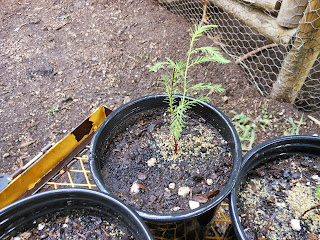The
Arboretum Tome will be hosting an open house on September 28th from 11am
- 4 pm. We are working in association with the Tome Art Gallery’s Garden Party
and Tour showcasing Highway 47 Garden related businesses. For more information
visit the Tome Art Gallery website at or click on the following link: http://tomegallery.net/
The Arboretum
Tomé is a collection of trees endemic to the desert Southwest. The collection
includes a huge collection of Oak trees, the genus Quercus, along with
Redwoods, Giant Timber Bamboo, and Maples, including a Western native
sugar maple called the Big Tooth Maple, Acer grandidentatum.
The
Arboretum also contains the production nursery for Trees That Please Nursery
and is the proving ground for Soil Secrets products. All plants on the
Arboretum grounds and Trees That Please Nursery are fed exclusively using the
products and protocols developed by Soil Secrets. The photo below shows transplanted Redwood seedlings inoculated with Earth Magic and Protein crumblies on the soil surface.
The
arboretum soil has served as the proving ground for the products of Soil
Secrets, changing the original toxic clay soil and rehabilitating it into a
healthy well drained soil that can now grow a wide variety of plants. The products of
Soil Secrets LLC meet the benchmark of the USDA’s NOP (National Organic
Program) and have been approved by USDA NOP Certifying Agents for use on
Certified Farms.
The
Arboretum serves as a living laboratory and is available for school field
trips, students, home gardeners, researchers, and individuals. The Arboretum is
a great place to spend some time under the shade of mature native trees, to
study and observe, to be inspired, or to see the great variety of native
landscaping trees the southwest has to offer.
The
Arboretum is open for tours by appointment only by contacting Trees That Please
Nursery at
Phone:
505-866-5027
Photos & Narrative By:
Stephen
Sain
Staff Plant Physiologist


Comments